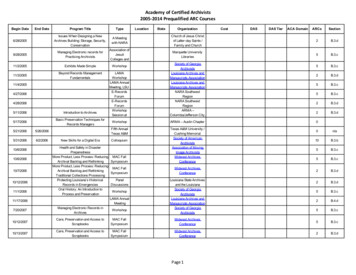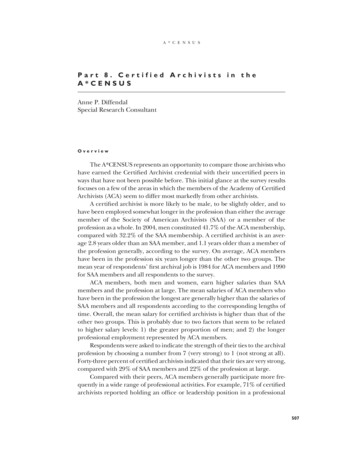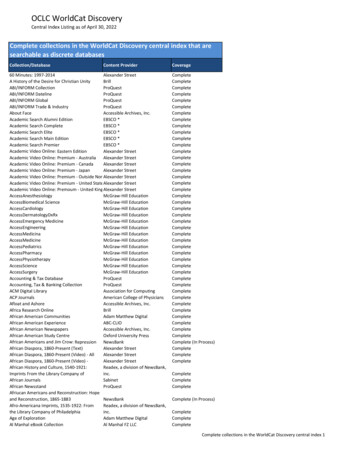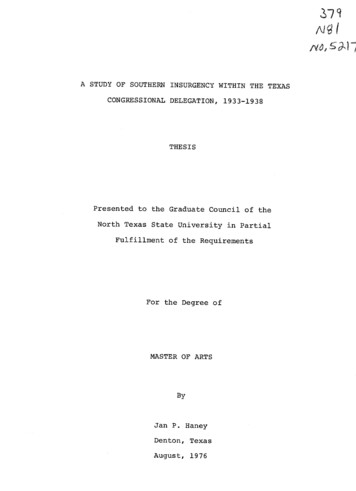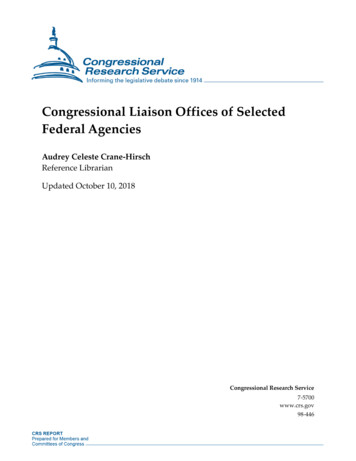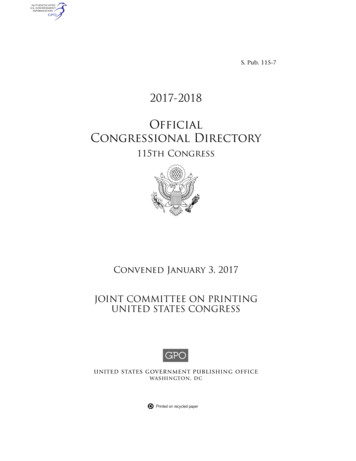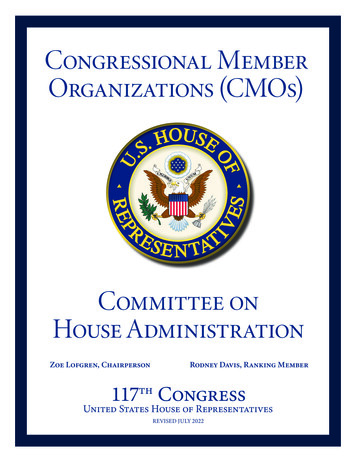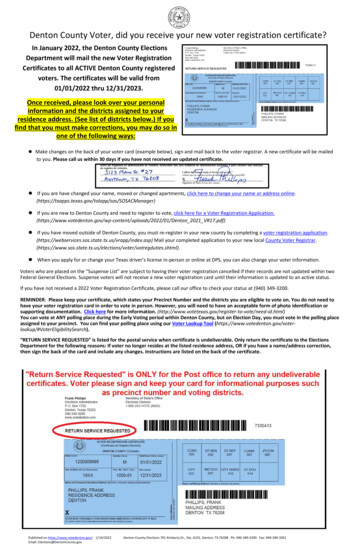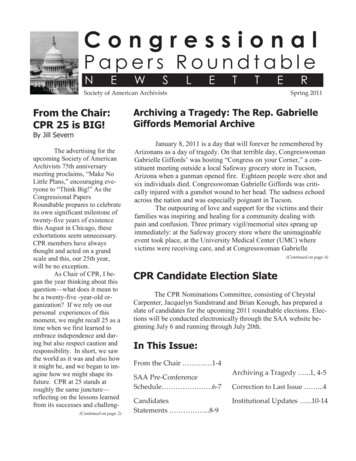
Transcription
CongressionalPapers RoundtableNEWSLETTESociety of American ArchivistsFrom the Chair:CPR 25 is BIG!RSpring 2011Archiving a Tragedy: The Rep. GabrielleGiffords Memorial ArchiveBy Jill SevernThe advertising for theupcoming Society of AmericanArchivists 75th anniversarymeeting proclaims, “Make NoLittle Plans,” encouraging everyone to “Think Big!” As theCongressional PapersRoundtable prepares to celebrateits own significant milestone oftwenty-five years of existencethis August in Chicago, theseexhortations seem unnecessary.CPR members have alwaysthought and acted on a grandscale and this, our 25th year,will be no exception.As Chair of CPR, I began the year thinking about thisquestion—what does it mean tobe a twenty-five -year-old organization? If we rely on ourpersonal experiences of thismoment, we might recall 25 as atime when we first learned toembrace independence and daring but also respect caution andresponsibility. In short, we sawthe world as it was and also howit might be, and we began to imagine how we might shape itsfuture. CPR at 25 stands atroughly the same juncture—reflecting on the lessons learnedfrom its successes and challeng(Continued on page 2)January 8, 2011 is a day that will forever be remembered byArizonans as a day of tragedy. On that terrible day, CongresswomanGabrielle Giffords’ was hosting “Congress on your Corner,” a constituent meeting outside a local Safeway grocery store in Tucson,Arizona when a gunman opened fire. Eighteen people were shot andsix individuals died. Congresswoman Gabrielle Giffords was critically injured with a gunshot wound to her head. The sadness echoedacross the nation and was especially poignant in Tucson.The outpouring of love and support for the victims and theirfamilies was inspiring and healing for a community dealing withpain and confusion. Three primary vigil/memorial sites sprang upimmediately: at the Safeway grocery store where the unimaginableevent took place, at the University Medical Center (UMC) wherevictims were receiving care, and at Congresswoman Gabrielle(Continued on page 4)CPR Candidate Election SlateThe CPR Nominations Committee, consisting of ChrystalCarpenter, Jacquelyn Sundstrand and Brian Keough, has prepared aslate of candidates for the upcoming 2011 roundtable elections. Elections will be conducted electronically through the SAA website beginning July 6 and running through July 20th.In This Issue:From the Chair . 1-4SAA Pre-ConferenceSchedule .6-7CandidatesStatements .8-9Archiving a Tragedy .1, 4-5Correction to Last Issue .4Institutional Updates .10-14
Congressional Papers Roundtable Newsletter(Continued from page 1)es, looking forward to the future, and consideringhow it might shape the future of congressional records keeping, archival practice, and civic life. Howlucky we are to be right at the center of this significant year! In tribute to this milestone, the steeringcommittee and I are working on several projectsthat honor CPR’s past, acknowledge its present,and imagine its future. Here is just a taste of whatis in the works at CPR central New TaskforcesThe steering committee has commissioned twonew taskforces in 2010 toaddress two areas of interestto CPR: documenting the history of the roundtable anddeveloping a mechanism formeasuring the needs and interests of current roundtablemembers.CPR HistoryTaskforceThe CPR HistoryTaskforce, consisting of Rebecca Johnson Melvin, LindaWhitaker and their internCary Osborne, has as its charge:x To propose guidelines and procedures for effective, comprehensive, and enduring documentation of Congressional Papers Roundtablex To assist the program committee with development of preconference and regular meetingcontent related to commemoration of CPR’s25th anniversaryThe CPR History Taskforce will submit areport to the Steering Committee for considerationin advance of the August meeting and the taskforcewill share a brief overview of its report and activities with general members at the CPR meeting/business meeting. As part of its report, this taskforce will make a recommendation as to whetherCPR should establish a subcommittee to carry thiswork forward. The members of this taskforce willalso play a central role in the 25th anniversary preconference program.CPR Member Survey TaskforceAs we prepare to mark our 25th anniversary, the steering committee thought it an oppor-Spring 2011tune time to survey members about their currentneeds and interests in relation to CPR. To this end,I appointed a small taskforce to develop and administer a brief online membership survey. The committee includes, Ben Rogers, Lori Schwartz, andDebra Davendonis-Todd, and myself. The teamwill submit a report in advance of the August meeting and the taskforce will share a brief overview ofits report and activities with general members at theCPR meeting/business meeting.Current Taskforces MovingForwardE-records TaskforceCPR established the Erecords Taskforce to create,introduce and publicize:x a checklist of questions/actions that repositoriesshould ask/take when acquiring a new congressional collection;x a congressional collections e-records policy template that members could useas a resource in developingtheir institution's own policy;x a list of resources for advice and assistancewith data recovery, migration, preservation,funding; and a bibliography of relevant literature.Since its inception, the taskforce has madegood headway in meeting this charge and plans toshare the results and analysis of its survey of CPRmembers and a full report of its activities on theCPR Website this summer. Additionally, it willshare resources for e-records via the CPR newsletter and announcements on the list serv.Pilot Internship ProgramIn 2010, CPR embarked on a new pilot internship program designed to provide new members of CPR and those interested in becoming moreactive in the organization an opportunity to havehands-on participation in the organization’s ongoing and special initiatives. Last September, CPRrecruited its first group of CPR interns ShannonLausch, Debra Davendonis-Todd, and Cary Osborne. Shannon has been an active member of the2
Congressional Papers Roundtable Newsletterprogram committee who has focused on strategiesto help CPR members—both new and old—tomeet and connect with each other at the preconference and throughout the year. Debra has been adiligent member of the team that has crafted theCPR membership survey and will be participatingin analyzing and reporting the results. Cary Osborne has joined the new history taskforce and isworking closely with Linda Whitaker and RebeccaMelvin Johnson to consider how the past shouldfigure in the present and the future of CPR programming and documentation. Cary has played acentral role in the planning of the panel sessionswith founders that will take place at this year’s preconference. As we finish out this first year of thispilot program, we will seek feedback from all whohave been involved with the program directly, anddetermine if it should continue and how it might berefined for the future.New Web siteIf you have visited the CPR Website recently, you have probably noticed that there havebeen some big changes to the design of the site.In early 2010, CPR and other SAA groups got thegreen light to move their Web pages into the newDrupal based Web environment developed forSAA’s site as a whole. Robin Reeder, CPR’s Webmanager and Morgan Davis, CPR newsletter editor, with help from CPR –past-chair Linda Whitaker and I worked to plan and move all the CPRweb content over to this new more robust environment by the close of 2010. Now that this basicmigration is complete, the group can begin to explore what refinements or expansion to the site willbe possible in this new environment. Please keep alook out for new virtual developments.Great Slate of Candidates for electionIt seems wholly appropriate that the groupcharged with preserving the central records of arepresentative government “of the people, by thepeople, for the people” should reflect this ethos inits elections and its operations. Therefore, it iswith great satisfaction and gratitude that I ampleased to announce that my predecessor, BrianKeough and his nomination/election committeehave secured an excellent slate of candidates to runin a fully contested election this year. Please doyour part and vote, vote, vote!2011 Preconference Program, CPRmember meeting, and 25th AnniversarySpring 2011CelebrationMark your calendars; August 24, 2011 is aday like no other! On this day, Congressional Papers Roundtable members will gather in Chicago atLoyola University’s Water Tower Campus to celebrate a major milestone in CPR’s history—twentyfive years of existence! The day will be filled withpanel discussions, interactive sessions, convivialnetworking, good food and great people. We willshare full details of the day, directions to the venue,and registration materials in early June via the CPRlistserv the CPR Web site. In the mean time, hereis a sampling of what is in store Twenty-five years is big! All of the members of the CPR program committee (ShannonLausch, Jill Severn, Lori Schwartz, Linda Whitaker, Betsy Pittman, and Kathy Young) realized thisfact and dove into the work of planning the preconference program, member meeting, and celebrationwith great gusto. Kathy Young, Archivist for Political Collections at Loyola University-Chicago, hasbeen an amazing local arrangements liaison extraordinaire. She has arranged for CPR to have itspreconference program, member meeting, and celebration in a lovely facility on Loyola’s Water Tower Campus, just a short distance from the SAAconference hotel. Kathy will share some of thewonderful materials in her collections with CPRmembers in one of the preconference program sessions.Taking our cue from SAA’s 360-degreeapproach to its meeting, the program committee forCPR has designed a day of events that honor thepast, acknowledge the present, and imagine the future. We will kick off the program with two morning sessions focused on the history of CPR from itsfounding through the present. In each session amoderator will lead a discussion with two groups ofpanelists who have been at the center of CPRsfounding (Lydia Lucas, Connie Gallagher, andCynthia Pease Miller) and subsequent development(Karen Paul, Sheryl Vogt, and Herb Hartsook).The program committee has developed these twosessions in concert with members of the CPR History Taskforce, who have suggested panelists, developed questions, and volunteered to moderate thesessions. Before lunch, we will all enjoy a presentation on Loyola’s political collections by our hostfor the day, Kathy Young. Box lunches will beavailable at the break. In the afternoon, we will turn3
Congressional Papers Roundtable NewsletterSpring 2011(Continued from page 3)our attention to the future and our roles therein.SAA Council member and CPR liaison Tom Hyrywill provide a brief overview of the strategic planning priorities for SAA as a whole. Following hispresentation, we will move into break out discussions where we will consider:x What are CPR’s strategic priorities?x How do SAA’s priorities align with prioritiesfor CPR?x How should CPR approach its strategic priorities?x What roles can CPR and SAA play in meetingthe priorities for each other?Facilitators will guide the conversation andcapture ideas expressed by participants. After thebreakout discussions, the group will gather as awhole and share ideas and priorities and in doingso will begin to construct a blueprint of ideas thatfuture CPR steering committees and members canfollow.After a short break, the annual CPR Membership meeting will begin at 3:15 p.m. in the samelocation as the preconference program. The focusof the meeting will be reports from the E-recordsTaskforce, the CPR History Taskforce, and theCPR Membership Survey Taskforce. Additionally,representatives from allied groups will providebrief updates relevant to CPR members and theirwork.Following the meeting, unrestrained frivolity will ensue at approximately 4:30 p.m. as we allgather to celebrate twenty-five years of congressional papers magic with cake and merrymaking.If you members have questions or ideasabout any of the activities outlined above, pleasefeel free to contact me, or a member of the CPRsteering committee. Our contact information isavailable on the CPR web site at sp.(GIFFORDS Continued from page 1)Giffords’ Office. Prior to my involvement withthe sites I, like many Tucsonans, visited the lawnat UMC to light a candle for the victims. Thesites were a place where the community couldcome together to show support, love, encouragement; and a place to grieve. Left behind wereteddy bears, flowers, get well cards, posters, art-A small portion of the boxes packed up during thedismantling of the UMC vigil site.work, candles, and stories of inspiration left onany type of medium that could be written on,from rocks to tiles, to paper chains.With the relocation of CongresswomanGiffords to Houston for continued rehabilitationand the release of the victims recovering atUMC, a new chapter in the healing process began. Plans to dismantle the vigil sites commenced. It was at that stage that I was contactedby representatives from the three vigil sites toassist in archiving the items. My role was to actas coordinator and consultant for the transfer ofthe materials from the sites to a safe and securestorage location.In consultation with representatives fromGiffords’ Office, UMC, and Safeway, a numberof meetings were held to determine the bestcourse of action for the removal of the materials.CorrectionDr. Gary Aguair’s article “Who Writes toTheir Senators?” in the Fall 2010 issue ofCPR news incorrectly stated that the Daschleand Dole archives “are the sole depositaries ofany [congressional] casework files.” Many CPRNews readers wrote in to correct this statement and a discussion of the retention andfuture research uses of congressional casework was conducted through the CPR discussion list in the following days.4
Congressional Papers Roundtable NewsletterSpring 2011(GIFFORDS Continued from page 4)As a group, we wanted to insure thatthe materials would be preserved, thatcommunication with the communitywas ongoing, and that materials specific to individual victims and their families would be given to them throughthe proper channels.During the early planning stages, I created guidelines that providedstep-by-step information on how theAerial photograph of the University Medical Center vigil site takendismantling would take place; includ- on January 26th .ing the cleaning and packing of itemsand labeling of boxes. The informationwas distributed to the packing companyand to key stakeholders. I also recruitedfour members of the Society of American Archivists Student Chapter at theUniversity of Arizona to assist with thepreservation and packaging of items andto oversee the dismantling of the materials at Congresswoman Giffords’ Office and at Safeway, while I coordinatedthe dismantling of the UMC site.As with any materials that areexposed to the elements for any lengthof time, damage to items occur, and thevigil/memorial sites were no exception. University Medical Center site at night. This photograph wasCaretakers of the three sites dutifully and taken on January 16th. (All photos by Chrystal Carpenter)respectfully maintained the items butwind, water, dirt, and critters deteriorated themade, and the 60 or so boxes from the sites wereobjects. Prior to the dismantling, a group of coltransported to UMC for safekeeping until theleagues and UMC staff completed a walkthroughnext stage of the process commences.of the UMC site identifying items that neededWorking on the removal of the memorialimmediate attention. Those items were removeditems was a humbling experience in which I wasfrom the UMC lawn and relocated inside thehonored to assist with. The sites and the materibuilding where they were dried, cleaned, andals are a lasting tribute to victims and their famipackaged. Shortly after, on February 4, 2011 thelies, they document the support and warmth of adismantling of the sites commenced.community riddled by tragedy, and they are aOver 30 volunteers, including UMC,powerful reminder of the historic and tragicSafeway, and Giffords’ staff were on hand at theevent which took place on January 8, 2011. Mysites to clean and package the items that day. Bywork on this project further solidified my beliefearly afternoon all the candles, tiles, and artifactsin the importance of what archivists do and thehad been wrapped. Cards and posters wereimportant role archives have in society, now andcleaned and boxed and flowers were picked upinto the future.and removed for drying. Decisions about the ma-Chrystal Carpenter, Manuscript and Congressionaljority of the stuffed animals and flowers wereArchivist, University of Arizona5
Congressional Papers Roundtable NewsletterSpring 2011CPR 25! Preconference & Meeting Schedule 2011Please note, registration information for this preconference will be available in earlyJune via the CPR listserv and the CPR Web site.Preconference and Member Meeting LocationRooms 303-304 Terry Student Center in Baumhart Hall on Loyola University’s Water Tower Campus,26 E. Pearson Street, Chicago, ILDirections: http://mapq.st/gb7Xq2Campus Map http://www.luc.edu/about/pdfs/wtc map020911.pdfCPR 25! Preconference Program, August 24, 20119:00-9:15Welcome and Brief RemarksJill Severn, Chair CPR9:15- 10:15 Sometimes a Great Notion: The Origins and Founding of CongressionalPapers RoundtableThree of the principal figures who laid the critical groundwork for the establishment of the Congressional Papers Roundtable will share their memories andperspectives on how and why they and others established the CongressionalPapers Roundtable.Panelists: Connie Gallagher, Cynthia Miller, Lydia LucasModerator: Rebecca Johnson Melvin10:15-10:30 Break10:30-11:30 Keeping up with Keeping Congress: 25 Years of Congressional PapersRoundtableReflections and perspectives from three CPR veterans who have been at thecenter of CPRs twenty-five year effort to set standards, propose solutions, andimagine new possibilities for managing congressional papers.Panelists: Karen Paul, Sheryl Vogt, Herb HartsookModerator: tba11:30-12:00 Congressional Archives at Loyola UniversityKathy Young, University Archivist at Loyola University Chicago shares somehighlights from the Congressional Archives of the Loyola University Archivesand Special d on next page6
Congressional Papers Roundtable NewsletterSpring 2011(Pre-conference Schedule continued)1:15-3:00What’s Next? Envisioning Our FutureEchoing the 360 perspective of SAA’s 75th anniversary meeting, CPR will reflect on itsresponsibilities and interests in relation to SAA’s strategic priorities of achieving greater diversity, harnessing technology, and developing effective advocacy. CPR’s SAAcouncil representative Tom Hyry will start the discussion by sharing an overview ofSAA’s strategic priorities. Following his presentation the group will break into threegroups to consider CPR’s goals and interests in relation to advocacy, technology, andadvocacy. Volunteer moderators will facilitate the group through the following steps:Brainstorming the top 5 challenges and opportunities facing CPR members inrelation to one of the three priorities (advocacy, technology, diversity)Setting priorities from the brainstormed ideasWhat are the immediate/long term needs?What will be easy/hard to do and why)?What can be or should best solved/approached individually, as a committee, as a roundtable, or as SAA?Following the breakout session, the three groups will come back together and moderators will report in brief. The work of the three sections will form the basis for settingstrategic priorities for CPR as it moves forward into its next 25 years3:00-3:15BreakCPR 25! Member Meeting 2011, August 24, 20113:15 -4:30CPR meeting/business meetingWelcome and report from CPR ChairSteering Committee and Interns Introductions (5 minutes)SAA Council RepresentativeSAA Program Committee RepresentativeCommittee and Task force Reports:Survey TaskforceE-Records TaskforceHistory TaskforceNomination CommitteeReports from Allied GroupsAssociation of Centers for the Study of Congress (Sheryl Vogt)Center for Legislative Archives (Matt Fulgham)Office of History and Preservation, U.S. House of Representatives (Robin Reeder )Senate Historical Office (Karen Paul)AnnouncementsAdjourn4:30-5:00Celebration of 25- year anniversaryPhoto-opCakeFrivolity7
Congressional Papers Roundtable NewsletterSpring 2011Congressional Papers RoundtableCANDIDATE STATEMENTS, 2011Candidates for Chair-Elect (2 candidates)x x The chair, vice-chair/chair-elect, and the immediate past chair serve as officers of the roundtable. Only individual members of SAA and the Congressional Papers Roundtable may hold these positions.The officers make a commitment for three years to serve one year each as vice-chair/chair-elect, chair, and immediatepast chair. Each is expected to attend the annual meeting.Name: Leigh McWhite, Ph.D.Title: Political Papers Archivist & Assistant ProfessorInstitution: University of MississippiEducationBA, International Studies and Economics, Rhodes College (Memphis, TN)MA, History, University of MississippiPhD, History, University of MississippiExperience with Congressional PapersManager of the Modern Political Archives at UM sinceits creation in 2004.Member of CPR, 2005-presentCPR Steering Committee, 2008-2010Co-chair of CPR Electronic Records Task Force, 2009presentWhat do you bring to the CPR chairmanship?Seven years ago, I faced an almost overwhelming task-- assuming responsibility for my institution’s massivecongressional collections while lacking any previousexperience with these complex creations. The publications, website, annual meetings, and other resourcesoffered by CPR and its members were invaluable, andI feel a tremendous responsibility to give back to theroundtable and ensure that future archivists will alsobenefit from its collective wisdom.What would you like CPR to do in the next fouryears?CPR is an active and productive group. Continuedsuccess will require active recruitment of members, anexpanded web presence offering even more resources,and maintenance of annual meeting programs that educate members on issues ranging from preservation andprocessing to fundraising and outreach.Name: Lori SchwartzTitle: Special Projects ArchivistInstitution: South Carolina Political Collections, Universityof South CarolinaEducation: MLIS and MA in Public History from the University of South CarolinaExperience with Congressional PapersI have been a full time political papers archivist at SC Political Collections since 2004. My first big project involvedworking with the papers of Sen. Ernest F. "Fritz" Hollings,whose collection covers 55 years of public service in severaloffices and stands at 800 linear ft (down from 2400ft). Since then, I have helped bring in, inventory, and/ororganize the papers of Congressmen Joe Wilson and JohnSpratt, among others, and also worked on events, outreachactivities, exhibits, our website, and training of graduatearchival students.What do you bring to the CPR Chairmanship?I've attended the pre-conference sessions held by CPR forseveral years now, am finishing up my second year as amember of the Steering Committee, and would welcome theexperience of serving as CPR Chair. I would bring to thechairmanship my willingness to share my honest opinionabout what issues we need to tackle over the next few yearsand what is working for our group and what is not. I bring ahigh level of enthusiasm for our chosen niche in the archivesworld and could use that to draw in new members and encourage others to step into leadership roles.What would you like CPR to do in the next four years?I would like to see CPR continue to reach out to archivistswho have found themselves working with political collections in their repositories, perhaps in a part-time capacity,but have not yet utilized our group as a valuable resource. Ihope the program this year at our pre-conference day in Chicago will begin that process, as we celebrate 25 years whileat the same time introducing new members to our uniquefield. Our discussions in Chicago should also provide aroadmap of issues for CPR to address in the coming years inthe areas of technology, outreach, and diversity. I would alsolike to continue the intern program inaugurated this year thatsaw three young archivists participate in the work of theSteering Committee.8
Congressional Papers Roundtable NewsletterSpring 2011Candidates for Steering Committee, two vacancies (3 candidates)The Steering Committee directs and coordinates activities of the roundtable and approves appointments made by the chair if vacancies occur.Name: Burt Altman, CA. MA, MLSTitle: Archivist/University LibrarianInstitution: Florida State UniversityLibraries, Special Collections and ArchivesEducation:BA, Political Science, Ithaca CollegeMA, History, Adelphi UniversityMSLS, Long Island UniversityName: Walter D. RayTitle: Political Papers ArchivistInstitution: Southern Illinois UniversityCarbondaleEducation:MA, International Relations, BostonUniversity; MA, Russian, MiddleburyCollege; PhD, Theology, University ofNotre DameName: Kathy YoungTitle: University ArchivistInstitution: Loyola University ChicagoEducation: Master of Science in American History, Illinois State University,1991; Master of Library and InformationScience with a concentration in ArchivalAdministration, Dominican University,2001; Certified Archivist, 2008Experience with Congressional PapersSince 1981, I have served as the Congressional Papers Archivist for theClaude Pepper Library (Florida StateUniversity Libraries), where I have alsomanaged processing projects for othercollections of political papers. In addition, I developed and implemented adigitization project for various collections and am leading efforts towardsdeveloping the Pepper Library as a political papers research center.Experience with Congressional PapersSouthern Illinois University Carbondalecurrently houses the papers of two U. S.Senators and four Congressmen, alongwith several other political papers andlabor collections. I have been workingwith these collections for almost fiveyears since becoming SIUC's first political papers archivist. In that time I havebuilt the political papers unit from theground up, exerting physical and intellectual control over existing collections,doing reference and outreach, acquiringnew collections and developing futuredonors.Experience with Congressional PapersI have been working with CongressionalPapers, specifically the Dan Rostenkowski papers and Henry Hyde papers, aspart of Special Collections since 2002.During the past several years I have doneeverything from working with the donors, their families and staff to designingnew work areas, including a new readingroom. Along the way I have worked withthe University General Counsel on deedsof gift, appraised collections, writtenpolicies and procedures, processed partsof the Rostenkowski papers, and supervised staff processing the collections.What do you bring to the CPR Steering Committee?CPR has been an invaluable resource forme in my work. I have been a membersince 2006. I served on the SteeringCommittee from 2007 to 2009. It wouldbe an honor to serve on the steering committeeI would bring to the task a strongdesire to see CPR continue to thrive to bethere for the several archivists I have metrecently--and the large number I knoware out there, some lone arrangers--facedwith seemingly daunting task of dealingwith newly acquired or unprocessed legacy collections of congressional papers.What do you bring to the CPR steering committee/chairmanship?I bring a life-long interest in Congressand Congressional papers to the steeringcommittee as well as a desire to continuelearning about and preserving these fascinating collections. I also bring a commitment to use my talents and skills tohelp CPR continue its outstanding workand service to the membership.What do you bring to the CPR Steering Committee?As a Steering Committee member, Iwould bring my excitement and passionfor congressional collections that I’veacquired in my professional work. Beginning with my recent experience innetworking with fellow CPR colleaguesto propose and develop an SAAroundtable session at the Chicago meeting, I would like to continue drawingupon the expertise of other congressional papers archivists, whom I feel wouldbe invaluable in exploring new ways toenhance access to and enable our repositories to promote these unique collections more efficiently.What would you like CPR to do inthe next four years?During the next four years, I would liketo see CPR develop approaches to efficiently utilize the expertise andknowledge of our fellow CPR archivists.In doing so, I feel we can build on ourknowledge base and refine our best practices for providing access to and promoting these resources.What would you like CPR to do innext four years?I have a few things I'd like to see theCPR Steering Committee focus on in thenext few years:x Continued support for the e-recordstask force as they unravel what Ithink is the most pressing challengefor congressional papers archivistsx Outreach to archivists with congressional papers collectionsx Outreach to members of Congress,perhaps with a downloadable brochure CPR members can use whenthey solicit congressional papersx Continuing to provide useful andtimely preconference programs forCPR members.What do you see CPR doing over thenext 4 years?I believe that over the next four years theCPR steering committee should focus ondeveloping opportunities for diversityand new member participation in theroundtable. Encouraging diversity andnew member participatio
stituent meeting outside a local Safeway grocery store in Tucson, Arizona when a gunman opened fire. Eighteen people were shot and six individuals died. Congresswoman Gabrielle Giffords was criti-cally injured with a gunshot wound to her head. The sadness echoed across the nation and was especially poignant in Tucson.
